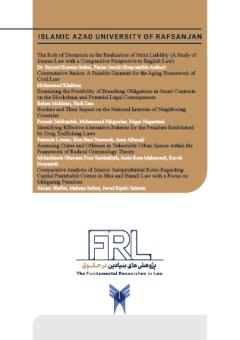Identifying effective alternative models for the punishments prescribed in the anti-narcotics law according to experts and experts
Subject Areas :Fatemeh Lavimi 1 , Eisa Baninaeimeh 2 * , amir alboali 3
1 - PhD student, Department of Criminal Law and Criminology, Ahvaz Branch, Islamic Azad University, Ahvaz, Iran.
2 - استادیار، گروه حقوق جزا و جرم شناسی، واحد آبادان، دانشگاه آزاد اسلامی، آبادان، ایران (نویسنده مسئول).
3 - Assistant Professor, Department of Criminal Law and Criminology, Abadan Branch, Islamic Azad University, Abadan, Iran (corresponding author).
Keywords: Anti-narcotics law, alternative effective models, punishment,
Abstract :
In the Anti-Narcotics Law and its amendment in 2009, Iran's legislator has always focused on the criminal policy based on repression and punishment by determining disproportionate and heavy punishments, especially death and life imprisonment, but this criminal policy is not very popular with the criminal policy. Judiciary (judiciary approach) has not been placed. The criminal policy governing drug crimes basically revolves around the axis of government responses, both criminal and non-criminal, but in the non-criminal response section that oversees prevention and treatment, the role of non-governmental organizations and organizations is noticeable. Also, due to the existence of ambiguous and unknown points related to the determination of the nature of crimes in the substantive laws and the lack of appropriate standards and criteria for the application of formal regulations regarding drug crimes. Also, the punishments related to drug crimes are a clear example of crimes that face problems due to the fact that their nature is not clear, how to apply the formal regulations and the application of some cooperative institutions in the Islamic Penal Code. And in relation to the determination of legal punishments by the legislator, there is no single and clear standard and basis, and no effective alternatives and suggestions have been explicitly stated for the legal punishments of narcotic drugs.
In the Anti-Narcotics Law and its amendment in 2009, Iran's legislator has always focused on the criminal policy based on repression and punishment by determining disproportionate and heavy punishments, especially death and life imprisonment, but this criminal policy is not very popular with the criminal policy. Judiciary (judiciary approach) has not been placed. The criminal policy governing drug crimes basically revolves around the axis of government responses, both criminal and non-criminal, but in the non-criminal response section that oversees prevention and treatment, the role of non-governmental organizations and organizations is noticeable. Also, due to the existence of ambiguous and unknown points related to the determination of the nature of crimes in the substantive laws and the lack of appropriate standards and criteria for the application of formal regulations regarding drug crimes. Also, the punishments related to drug crimes are a clear example of crimes that face problems due to the fact that their nature is not clear, how to apply the formal regulations and the application of some cooperative institutions in the Islamic Penal Code. And in relation to the determination of legal punishments by the legislator, there is no single and clear standard and basis, and no effective alternatives and suggestions have been explicitly stated for the legal punishments of narcotic drugs.

